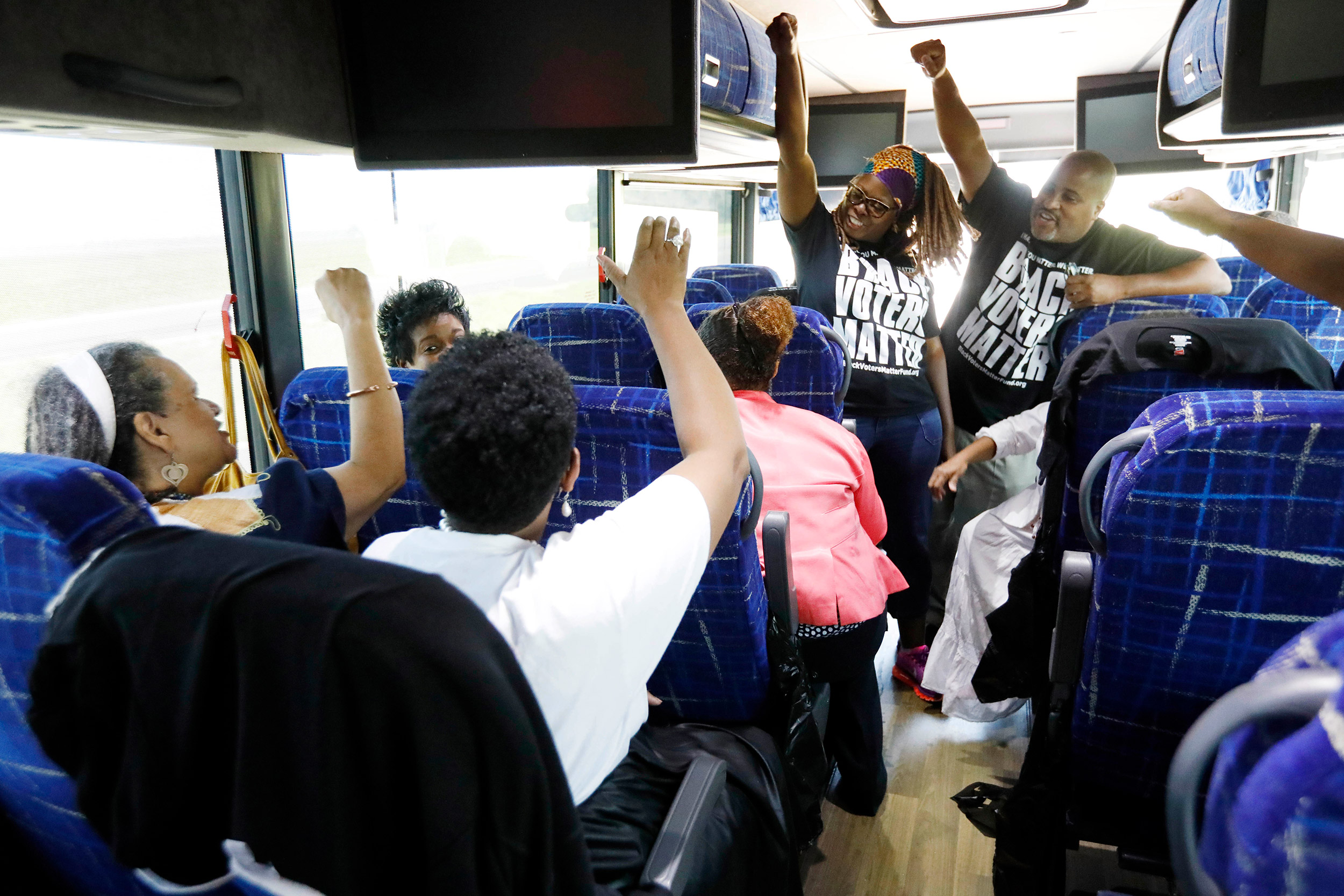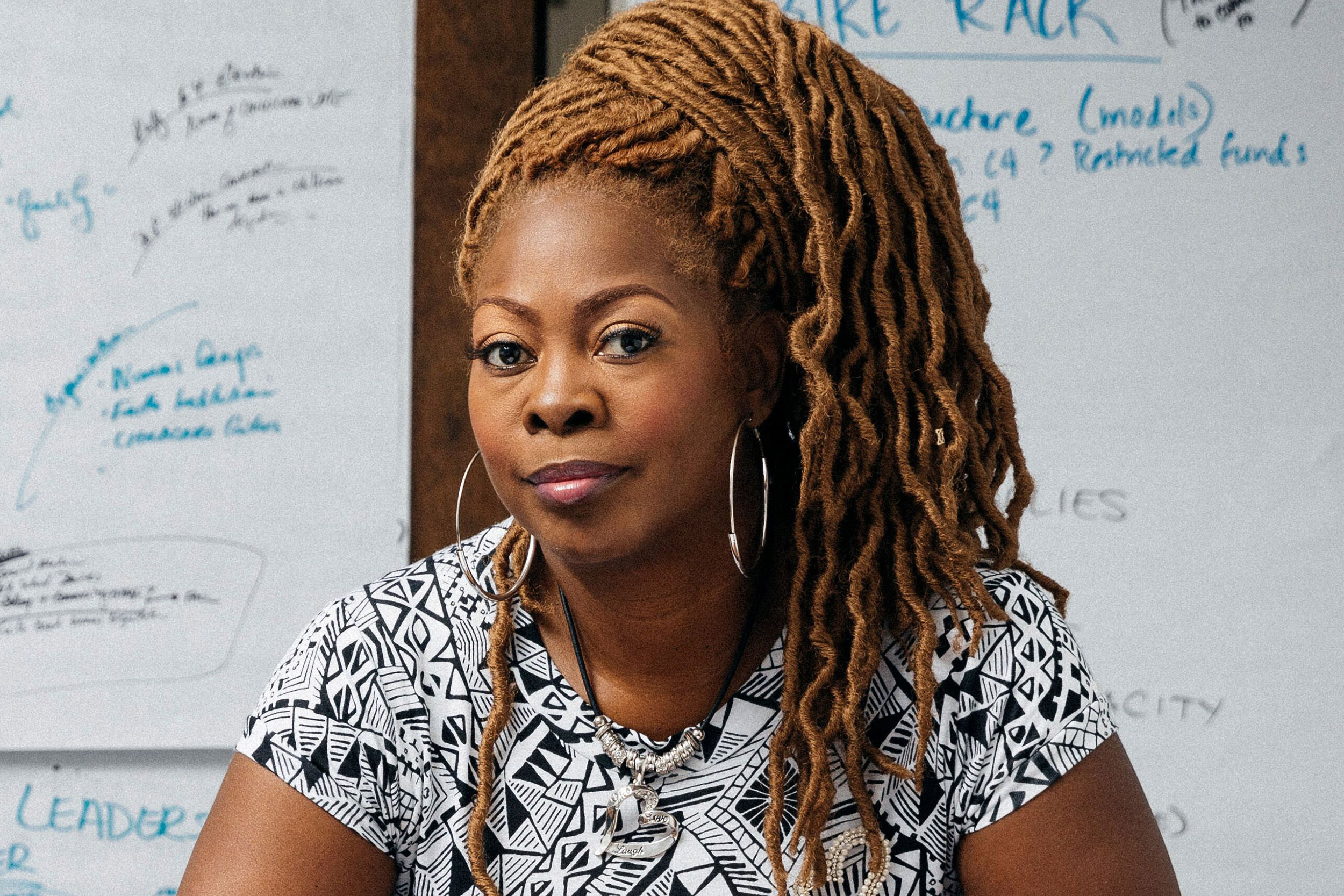
Black Voters Matter Fund co-founders, LaTosha Brown (left) and Cliff Albright led Mississippi grassroots partners in some empowerment cheers aboard a bus tour to Greenville, Miss.
AP Photo/Rogelio V. Solis
Black voters take the wheel
Activist says key to record turnout in last election was education
Suppression of Black voter participation has been a problem in America since Reconstruction ended in the late 1870s, but rarely have attempts been so blatant or backfired so spectacularly as they did during the November presidential election and again during the runoff voting in January to fill Georgia’s two U.S. Senate seats. Thanks to record turnout of Black voters, the Democratic Party now controls the White House, Senate, and House of Representatives for the first time since 2009. The NAACP filed suit Tuesday on behalf of Democratic Rep. Bennie Thompson of Mississippi against former President Trump, his attorney Rudy Giuliani, and two right-wing extremist groups accusing them of inciting the Jan. 6 assault on the Capitol to prevent Congress from certifying the election.
Those record turnouts didn’t just happen. They came after years of work by voting rights activists who had to show people the value that democracy has in their everyday lives, said LaTosha Brown, co-founder of Black Votes Matter and the Southern Black Girls and Women’s Consortium.
“Part of what they did in Selma, and even part of the work that we do in voting rights [advocacy], isn’t just about getting people to vote. It’s really around how do we make democracy real? How do we enshrine this value and make it real?” Brown said during a Feb. 11 conversation about the 2020 election with Khalil Gibran Muhammad, professor of history, race, and public policy at Harvard Kennedy School and the Suzanne Young Murray Professor at the Radcliffe Institute for Advanced Study.
First as a community organizer and later as a voting rights activist, Brown said educating folks has always been her first step to creating change.
“What we would do is engage people in a conversation about recognizing that they are part of the shaping of what governs them — which is very different than learning what the governing structure is,” she said. Not teaching them about an inherited system of government or how best to work within or respond to that system, but getting them to feel “a sense of their own empowerment” and that “they have a responsibility — and they have agency — to really determine who governs and what governs them.”
Muhammad and Brown said Black voters understood very early in the campaign about the existential threat posed to American democracy if they did not defeat the latest efforts to disenfranchise them, particularly in key battleground states such as Georgia, Michigan, Wisconsin, Pennsylvania, and Texas.
“I started doing voting work because I started understanding that if we wanted to change policy, we had to engage people in the political process, and we had to get people in office,” says LaTosha Brown, a fellow at Harvard.

“The truth of the matter is, we’re going to have to be honest in this country: Democracy, at its best, has been aspirational. It is still an idea,” said Brown, a 2020‒2021 American Democracy Fellow at Harvard’s Charles Warren Center for Studies in American History.
Her involvement in politics and voting rights activism dates back to the 1990s, when she was in her early 20s and began organizing in public housing in Selma, Ala., her family’s longtime hometown.
“I started doing voting work because I started understanding that if we wanted to change policy, we had to engage people in the political process, and we had to get people in office,” she said.
More like this
In 1998, Brown tried her hand at elected office, running a campaign for the Alabama state board of education “out of a VW Jetta and a Kinkos.” It was a “long-shot” candidacy: a single mother and political unknown, going up against a popular 12-year incumbent. “I didn’t know what I didn’t know,” she said.
With less than 200 votes ultimately separating the candidates, it took a week to officially call the race. Then, just moments after it was certified for her opponent, Brown said she was informed that the sheriff in one county where she had done well “forgot” that he had placed 800 ballots in a safe prior to the election. Those votes would not be counted.
“I remember feeling so powerless,” Brown recalled about what prompted her early activism. But after talking to others, she soon found out many Black candidates had similar stories. “I realized at that point how common it was … to steal these elections and part of the challenge was no one was ever held accountable.”
Asked what the secret was to the surprise victories of both Democratic Party challengers in Georgia, the Rev. Raphael Warnock and Jon Ossoff, Brown credits grass-roots organizing across every county and not trying to convince people to embrace or reject a specific candidate, but to connect to a broader idea.
“Our candidate was Black power,” Brown said of her group’s pitch to voters in Georgia, which has historically low rates of African American voter registration and a long history of efforts to disqualify or purge Black voters. The message was, “‘Yes, in spite of the voter suppression, we have power, y’all.’ It was that fundamental. I could go to places and tell people, ‘We have power’ and see them literally shift,” she said.
Reaching those who have disengaged with politics for a variety of reasons has nothing to do with persuading them to buy into the value of democracy, either.
“Our focus was never getting people to believe in a system that we know is inherently racist. It is to believe in themselves,” she said. “If you can get people to believe in their power and their agency, it becomes harder to oppress those folks. It is hard to tell them that they don’t have a voice; it is hard to tell them that they don’t govern themselves.”
Contrary to media narratives, Black voters did not turn out in record numbers in the 2020 election because they were excited by Biden’s candidacy or because of a blind allegiance to the Democratic Party, said Brown. Having seen power abused and the law ignored without consequences throughout history, voters saw preventing another four years of the administration of Donald Trump, whose affinity for white nationalists was out in the open, as a matter “of our own survival.”
Now that Biden is president, she believes most expect three things from his administration: far greater police accountability, including reforms to how police engage with Black individuals and communities; relief, both health and economic, from the effects of the COVID-19 pandemic, which has disproportionately harmed Black people; and passage of the John Lewis Voting Rights Advancement Act to restore protections jettisoned by the 2013 Supreme Court decision (Shelby County v. Holder) that ended key protections of the Voting Rights Act of 1965. That legislation alone, however, will not be enough to hold back voter-suppression efforts underway in dozens of states even after the election, she said.
“I think the Black community is [not only] looking for sweeping changes in how our right to vote is protected, but that we make democracy more embedded and protected and real in this country,” said Brown.







